#polling
Explore tagged Tumblr posts
Text
If you're wondering why polling averages are suddenly showing Trump winning despite all the bad news he's gotten lately- it might have something to do with this:

Basically, Republicans are ratfucking the polling averages by churning out huge numbers of partisan polls, and the polling aggregators/analysts like 538 aren't doing due diligence to compensate for it.
Now, what is the purpose of this?
Well, in the immediate-term, it creates a narrative that Trump is winning, boosting morale of his supporters while demoralizing support for Democrats and Harris.
Beyond that, if polling averages show that Trump is winning ahead of election day-which we can pretty much guarantee they will, because see above-then they will use that as "proof" of fraud if Democrats subsequently win.
Basically, they are engineering a pretext for their next coup attempt in front of us.
The only numbers that decide anything are actual votes. So ignore the polls, and VOTE.
#US#Politics#Election#2024#Polls#Polling#Polling Aggregators#Polling Averages#Ratfucking#Republican Cheats#Republican Liars#Coup#Volunteer#Organize#Campaign#Donate#Check Your Voter Registration#Vote#Vote Early#Kamala Harris 2024#Harris/Walz 2024#Yes We Kam!#Vote Blue
19K notes
·
View notes
Text
#tumblr polls#oscar isaac#finn wolfhard#emma myers#jodie comer#steven yeun#zoe saldana#denzel washington#natalie portman#david harbour#bruce lee#john cho#brie larson#hailee steinfeld#jeremy renner#vtuber#peter dinklage#star wars#john boyega#polling#poll#random polls#poll time#fun polls#polls#my polls#fake movies#fake film#movie stuff#actors and actresses
308 notes
·
View notes
Text
reblog for size or whatever yada yada yada
#polls on tumblr#tumblr polls#pollls#poll#tumblr poll#polling#pls answer#hatting#putting hats on people
2K notes
·
View notes
Text

215 notes
·
View notes
Text
So, in science & technology studies, one of the words we throw around is "scientization," the act of making something into a science. And, you know, a lot of this is good, or at least neutral: the scientization of medicine; the scientization of cosmology; it means that a field has gotten more rigourous and definitive than it used to be.
But in politics, what scientization often means is that something that should be a policy issue is kicked over to scientists as a means of naturalizing or normalizing it, exempting it from normal political debate, or avoiding responsibility for unpopular decisions. "Oh, we needed to bomb this place because our models said it would end the war faster"; "Oh, we needed to privatize this service because our economists said it would save us money"; etc. And a lot of the debate in the field of science policy is given over to the question of when is it legitimate to kick something over to scientists, and in what contexts, because it's often kind of arbitrary. Like, I think that anyone who takes climate change seriously believes that science needs to inform the response to it, but you can build whatever assumptions you want to into your models, and the math will gobble them up indifferently; and Western liberal governments have overwhelmingly chosen to imagine scenarios where we can just keep doing capitalism because magical new "carbon capture" technologies will probably be invented down the line, and cap-and-trade will probably work perfectly, and anything that might be lost due to climate change can be straightforwardly assigned a monetary value and compensated, and refugees from desertification and rising sea levels will probably just not exist and so on. [Obligatory reminder that Climate Change is way worse than pretty much anyone in mainstream politics is willing to admit]
And anyways, I think that a special case of this "scientization-as-political-bullshit" phenomenon is at play in the field of polling. Like, consider Kamala Harris's entire campaign (or if you prefer, practically any neoliberal politician's campaign anywhere in the world since 2008 or so). This was a campaign where seemingly every decision was kicked over to pollsters. Can't call conservatives weirdos--you might offend moderates! Can't call on Israel to stop bombing Gaza--you might offend moderates! Can't stand up for transgender rights--you might offend moderates! Can't call for single-payer healthcare--you might offend moderates! And so on, and so forth. In every case, it's trying to do politics without being political, and it's doing so by embedding a bunch of incredibly insidious assumptions into models and then calling it science! Like, maybe "moderate" voters would get on board with a ceasefire, or trans rights, or single-payer healthcare, if a prominent politician with a billion-dollar war chest to get her message out fucking tried to make a case for it! Like, remember when the overwhelming majority of Americans opposed gay marriage? I do! I wonder why that changed? Or, for that matter, why courting moderates--as all of these models seem to assume--should necessarily be a higher priority than inspiring disenchanted voting-age adults to turn out at all?
And I worry I'm making this sound like innocent incompetence--it's not. This was done very specifically and very intentionally to foreclose upon discussion of progressive priorities while saying that you're being scientific; while saying that you are, ridiculously, being apolitical when a running a political campaign. And now we have these useless, disingenuous assholes patting themselves on the back and saying that this campaign was never winnable! Because the "SCIENCE" says so!
And meanwhile, you have Donald Trump--idiot nazi bastard thug child of a demon and a swine Donald Trump, cursed be his name--bowling through the political scene like a bull in a china shop, utterly indifferent to all of these fancy-schmancy mathematical models and too stupid to understand them...and winning enormously! Making his own coalition. Because thick as he may be, ignorant as he may be, incurious as he may be, he at least knows one single solitary thing that the Democrats don't: Politics isn't science; it's magic. And you don't get anywhere in magic without the will to power.
#essay#long post#us politics#neoliberalism#science#scientization#science and technology studies#policy#polling
192 notes
·
View notes
Text

Today is the Agreed Upon Solutions election day voting snapshot! We've reset all votes and are recalculating from scratch, so come vote!
Agreed Upon Solutions is an experimental freelance democracy, designed to find out what people would support if given a much more expressive voting system; then to backport the results in bulk to our actual government. We're building it like a game, but the ultimate goal is to design and build voting software capable of tackling really complex and nuanced questions. Our roadmap goes all the way to writing fully fleshed out laws.
We're holding a vote we call Every Thing, over 157,000 topics extracted from Wikidata. If Wikipedia knows about it, it's on this list. You can comment and vote on literally all concepts: everything from "abortion" and "climate change," to "fatigue as safety concern" and "infant mental health". Our goal today is to get as accurate a summary as possible of opinions on the day of the election, both to have a record and to provide an explicit example of how democracy can be used to reach consensus decisions.
We need votes, and we especially need comments on topics, because every comment is a potential new dimension for analysis. We'll be using this data going forward for visualizations, experiments with automated summaries, cluster finding, everything you can imagine.
If you've ever thought to yourself, "Man, wouldn't it be great if we had a democracy where we could vote on absolutely anything," you have a chance to do that now. Come check us out!
297 notes
·
View notes
Text
in either case it takes about the same amount of energy to do as getting up off the couch.
Edit: 500 miles is about 800 km (how did i remember to convert on one option but not the other???)
Thoughts on 500 miles: you can go really far, really fast, but you need to have been somewhere exactly 500 miles away from where you are to use it at all, and then you need a series of places 500 miles apart to work your way towards your destination. If you can first do a little traveling and build up a network of places 500 miles apart to jump around between, this could help you get around pretty quickly. Requires a lot of planning but could be used for crime.
Thoughts on 500 feet: not useful for going far fast, because it’s slower than walking having to wait 10 minutes between uses. But it can let you get around barriers and into closed off areas if you’ve been there before. Can still save time if you just need to jump once to somewhere within 500 ft and then more than 10 minutes later jump back. Like there’s a pizza place less than 500 ft from my house that I could jump to, order, wait there for my pizza, and then jump back home. Might save time in complex 3D environments or when there are many doors involved, idk. i guess it does save a little time while walking in that you can walk during the 10 minutes and so it really makes you move an extra 500 ft per 10 minutes. Also huge potential usage for crime.
#my polls#tumblr poll#poll#tumblr polls#polling#random polls#poll time#polls#super powers#teleportation#sabrina says
115 notes
·
View notes
Text

Keep on fighting the good fight. Every election.
Kamala Harris and Tim Walz are gaining because they have great policies and possess morals, integrity, and principles.
Democrats are clearly better at economic stability, job creation, and empathy/character.
Stay engaged. Vote. Donate. Stay positive. 💙✌🏻
241 notes
·
View notes
Text
When prophecy fails, election polling edition

In Canto 20 of Inferno, Dante confronts a pit where the sinners have had their heads twisted around backwards; they trudge, naked and weeping, through puddles of cooling tears. Virgil informs him that these are the fortunetellers, who tried to look forwards in life and now must look backwards forever.
In a completely unrelated subject, how about those election pollsters, huh?
Writing for The American Prospect, historian Rick Perlstein takes a hard look at characteristic failure modes of election polling and ponders their meaning:
https://prospect.org/politics/2024-09-25-polling-imperilment/
Apart from the pre-election polling chaos we're living through today, Perlstein's main inspiration is W Joseph Campbell 2024 University of California Press book, Lost in a Gallup: Polling Failure in US Presidential Elections:
https://www.ucpress.edu/books/lost-in-a-gallup/paper
In Campbell's telling, US election polling follows a century-old pattern: pollsters discover a new technique that works spookily well..for a while. While the new polling technique works, the pollster is hailed a supernaturally insightful fortune-teller.
In 1932, the Raleigh News and Observer was so impressed with polling by The Literary Digest that they proposed replacing elections with Digest's poll. The Digest's innovation was sending out 20,000,000 postcards advertising subscriptions and asking about presidential preferences. This worked perfectly for three elections – 1924, 1928, and 1932. But in 1936, the Digest blew it, calling the election for Alf Landon over FDR.
The Digest was dethroned, and new soothsayers were appointed: George Gallup, Elmo Roper and Archibald Crossler, who replaced the Digest's high-volume polling with a new kind of poll, one that sought out a representative slice of the population (as Perlstein says, this seems "so obvious in retrospect, you wonder how nobody thought of it before").
Representative polling worked so well that, three elections later, the pollsters declared that they could predict the election so well from early on that there was no reason to keep polling voters. They'd just declare the winner after the early polls were in and take the rest of the election off.
That was in 1948 – you know, 1948, the "Dewey Defeats Truman" election?
https://en.wikipedia.org/wiki/Dewey_Defeats_Truman
If this sounds familiar, perhaps you – like Perlstein – are reminded of the 2016 election, where Fivethirtyeight and Nate Silver called the election for Hillary Clinton, and we took them at their word because they'd developed a new, incredibly accurate polling technique that had aced the previous two elections.
Silver's innovation? Aggregating state polls, weighting them by accuracy, and then producing a kind of meta-poll that combined their conclusions.
When Silver's prophecy failed in 2016, he offered the same excuse that Gallup gave in 1948: when voters are truly undecided, you can't predict how they'll vote, because they don't know how they'll vote.
Which, you know, okay, sure, that's right. But if you know that the election can't be called, if you know that undecided voters are feeding noise into the system whenever you poll them, then why report the polls at all? If all the polling fluctuation is undecided voters flopping around, not making up their mind, then the fact that candidate X is up 5 points with undecided means nothing.
As the finance industry disclaimer has it, "past performance is no guarantee of future results." But, as Perlstein says, "past performance is all a pollster has to go on." When Nate Silver weights his model in favor of a given poll, it's based on that poll's historical accuracy, not its future accuracy, because its future accuracy can't be determined until it's in the past. Like Dante's fortune-tellers, pollsters have to look backwards even as they march forwards.
Of course, it doesn't help that in some cases, Silver was just bad at assessing polls for accuracy, like when he put polls from the far-right "shock pollster" Trafalgar Group into the highly reliable bucket. Since 2016, Trafalgar has specialized in releasing garbage polls that announce that MAGA weirdos are way ahead, and because they always say that, they were far more accurate than the Clinton-predicting competition in 2016 when they proclaimed that Trump had it in the bag. For Silver, this warranted an "A-" on reliability, and that is partially to blame for how bad Silver's 2020 predictions were, when Republicans got pasted, but Trafalgar continued to predict a Democratic wipeout. Silver's methodology has a huge flaw: because Trafalgar's prediction history began in 2016, that single data-point made them look pretty darned reliable, even though their method was to just keep saying the same thing, over and over:
https://www.ettingermentum.news/p/the-art-of-losing-a-fivethirtyeight
Pollsters who get lucky with a temporarily reliable methodology inevitably get cocky and start cutting corners. After all, polling is expensive, so discontinuing the polls once you think you have an answer is a way to increase the enterprise's profitability. But, of course, pollsters can only make money so long as they're somewhat reliable, which leads to a whole subindustry of excuse-making when this cost-cutting bites them in the ass. In 1948, George Gallup blamed his failures on the audience, who failed to grasp the "difference between forecasting an election and picking the winner of a horse race." In 2016, Silver declared that he'd been right because he'd given Trump at 28.6% chance of winning.
This isn't an entirely worthless excuse. If you predict that Clinton's victory is 71.4% in the bag, you are saying that Trump might win. But pollsters want to eat their cake and have it, too: when they're right, they trumpet their predictive accuracy, without any of the caveats they are so insistent upon when they blow it:
https://www.youtube.com/watch?v=1jDlo7YfUxc
There's always some excuse when it comes to the polls: in 1952, George Gallup called the election a tossup, but it went for Eisenhower in a landslide. He took out a full-page NYT ad, trumpeting that he was right, actually, because he wasn't accounting for undecided voters.
Polling is ultimately a form of empiricism-washing. The pollster may be counting up poll responses, but that doesn't make the prediction any less qualitative. Sure, the pollster counts responses, but who they ask, and what they do with those responses, is purely subjective. They're making guesses (or wishes) about which people are likely to vote, and what it means when someone tells you they're undecided. This is at least as much an ideological project as it is a scientific one:
https://prospect.org/blogs-and-newsletters/tap/2024-09-23-polling-whiplash/
But for all that polling is ideological, it's a very thin ideology. When it comes to serious political deliberation, questions like "who is likely to vote" and "what does 'undecided' mean" are a lot less important than, "what are the candidates promising to do?" and "what are the candidates likely to do?"
But – as Perlstein writes – the only kind of election journalism that is consistently, adequately funded is poll coverage. As a 1949 critic put it, this isn't the "pulse of democracy," it's "its baby talk."

Today, Tor Books publishes VIGILANT, a new, free LITTLE BROTHER story about creepy surveillance in distance education. It follows SPILL, another new, free LITTLE BROTHER novella about oil pipelines and indigenous landback.

If you'd like an essay-formatted version of this post to read or share, here's a link to it on pluralistic.net, my surveillance-free, ad-free, tracker-free blog:
https://pluralistic.net/2024/09/26/dewey-beats-truman/#past-performance-is-no-guarantee-of-future-results
#pluralistic#prognostication#polling#uspoli#elections#pollsters#fivethirtyeight#nate silver#george gallup#rick perlstein#history#past performance is no guarantee of future results#W Joseph Campbell#Lost in a Gallup
153 notes
·
View notes
Text
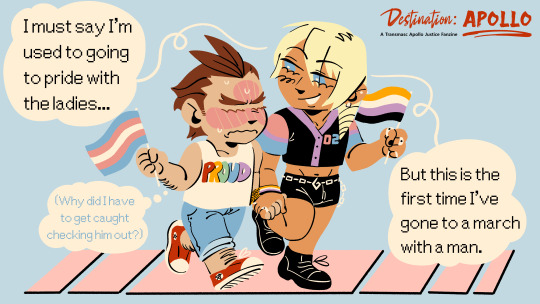
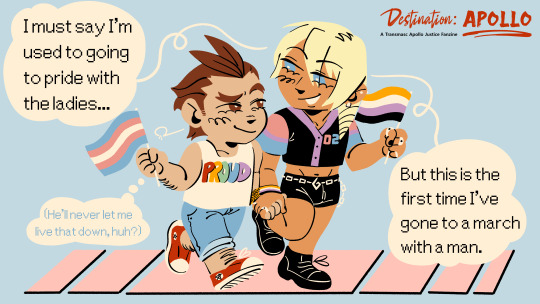
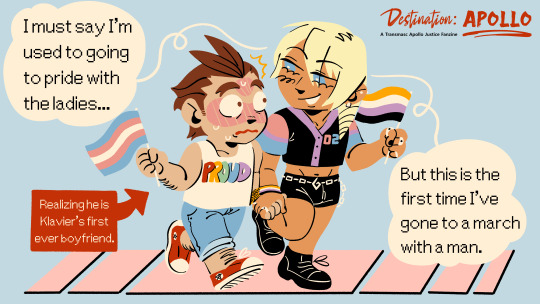
I drew these in celebration for Klapollo First Meeting day for @transapollozine! Consider following, or filling out and sharing our interest check! (both would help a TON!)
296 notes
·
View notes
Text
youtube
David Doel is a Canadian videographer who has previously dabbled in left of center politics up north. He has a well regarded YouTube channel called The Rational National. In the episode above, he describes the astonishing turnaround in Canadian politics over the past few months. Actually, astonishing is one of the milder words which could be used.
Just three months ago Justin Trudeau's Liberal Party of Canada (LPC) was sinking in the polls. The LPC in some polls was below 20% – even sometimes losing second place to the New Democratic Party (NDP). The Conservative Party of Canada (CPC) was in the mid to upper 40s – putting them on track to form a majority government after the next federal election. CPC leader Pierre Poilievre was probably picking out new curtains for the prime minister's office.
Then along comes Donald Trump. His tariffs, bellicose statements, and threats to the sovereignty of Canada sent shockwaves through Canadian politics. Pierre Poilievre, who has been seen as Trump friendly or soft on Trump, saw his party's popularity sink. And when Justin Trudeau announced his resignation, Poilievre was deprived of his political scapegoat. When Trudeau was replaced by Mark Carney as Liberal leader, the Liberals got a bounce which made Poilievre's situation even worse.
This is from the latest poll by Angus Reid, an established and respected pollster. The colors are somewhat different in Canadian politics than in the US. See the key at the bottom.
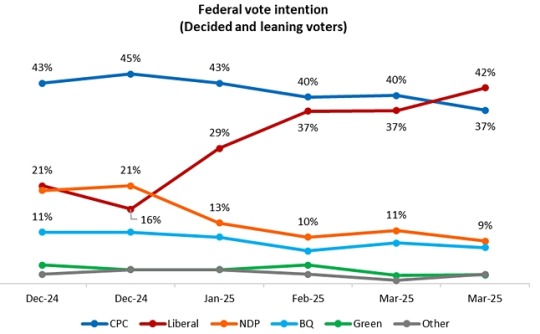
So on Christmas Eve, the Liberals were at a miserable 16% while the Conservatives were coasting at 45%. NOW the Liberals are 5 points ahead of the slumping Conservatives.
Canada does not have proportional representation. Its system largely mirrors that of the UK. So let's look at a province by province seat projection for the next parliament from 338Canada.
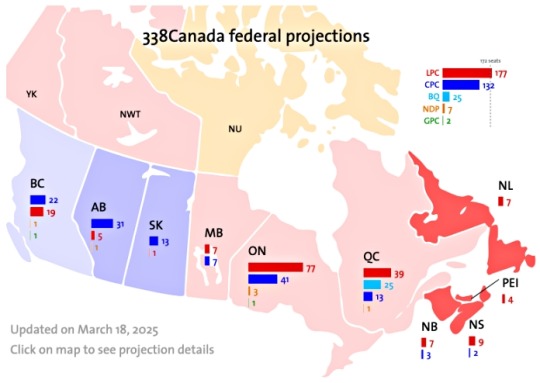
So instead of sinking in quicksand, the Liberals may be on track to form a majority government – an improvement over their current status. And there's still some room for improvement over their projected 177 seats.
If you were ever tempted to take an interest in Canadian politics, there has probably never been a better time to start than now.
Parliament returns next week. The most likely dates for an election are April 28th or May 5th. Anything short of a Conservative win would likely be interpreted as a slap in the orange face to Trump.
EDIT: A couple of very recent news stories from the CBC which illustrate the attitudes of the two main parties.
Carney signals he's in no rush to speak with Trump after visit to U.K., France
Conservatives won't allow reporters to travel with Poilievre during upcoming election
Prime Minister Carney just got back from a trip to Europe where he met with the leaders of Britain and France. But he's not in a hurry to see Trump. Meanwhile, the Conservatives are barring the media from their campaign planes and buses; like Trump they shun transparency.
#canada#david doel#elections#polling#tariffs#canadian sovereignty#donald trump#trump imperialism#maga#bad neighbor#trade war#liberal party of canada#mark carney#justin trudeau#conservative party of canada#pierre poilievre#ndp#angus reid#338canada#elbows up
58 notes
·
View notes
Text
#Poll#random polls#tumblr poll#polls#poll time#my polls#tumblr polls#spin the wheel#polling#goober posting#reblog please
61 notes
·
View notes
Text
#tumblr polls#nicholas cage#lee jung jae#millie bobby brown#robert downey jr#idris elba#pedro pascal#peter pan#halle berry#kaitlyn dever#billie eilish#cody rhodes#simu liu#scarlett johansson#viola davis#tom hiddleston#keanu reeves#ben kingsley#adria arjona#the kraken#movie idea#fake movies#fake film#polling#poll#random polls#fun polls#polls#my polls#poll time
129 notes
·
View notes
Text

Get ready folks, this is the big one. All our hard work culminates right here. It has been a hard fought war. We've pitted brother against brother, sister against sister. And it all comes to a head right now. In corner A, we have Vivian, the rebel, who stays trie to her heart and fights for justice and against fascism. In corner B, we have X Æ A-Xii, the nepo baby, given everything by his father for the small price of being a human shield. You, dear reader, gets to decide: which of these two deserve to inherit the Tesla empire? Which of these two shall dethrone their father in cold blood and claim their inheritance?
ARGUMENTS
VIVIAN
The Eldest Daughter.
Transitioned 🏳️⚧️ to be her true self against her father’s wishes and purposely drags his rotten name in the mud when she can. She even changed her last name. She is also a Neon Genesis Evangelion enjoyer.
Nonetheless she hates her dad, and here’s a quote from an interview pertaining to if she feared her dad:
Quote: ”He’s a pathetic man-child. Why would I feel scared of him?… I don’t give a f**k. why should I be scared of this man? Because he’s rich? Oh, no, I’m trembling. Ooh, shivering in my boots here. I don’t give a f**k how much money anyone has.”
If anyone deserves to smite her father, it’s her. If anyone deserves to take over the Tesla Empire of Mars, it’s her. Trust, and imagine how great it would be to see her win. Go women.
Simply think of the future she would bring, and the look on El*ns face when it happens.
- MB
X Æ A-Xii
It's not his fault he's being used! He is simply a political prop for his father's sick game. Let the son defeat the father. Have you not also watched Succession and begged Kendall to claim the Roy throne for himself with his own two hands? Make your dreams come true. Catharsis.
- MG
He also told t/rump to “shush” and “he’s not the president” at an official whitehouse interview which was kinda funny.
- MB
#tesla succession bracket#succession#game of thrones#billionaire#space#nge#nen genesis evangelion#Kendall roy#l to the og#asuka shikinami#mecha#lgbt#transgender#trans pride#shiv roy#Dan and phil#hatsune miku#disco elysium#fnv#honestly any anti capitalist media#Those are the only ones i know#Invincible#i guess??#Fallout new vegas#Also viv beat homestuck#And x beat damian#Finals#polls#polling#tumblr polls
56 notes
·
View notes
Text
Donald Trump’s co-president, Elon Musk, is deeply unpopular, and his unlawful meddling in the federal government through the Department of Government Efficiency, a federal advisory commission he leads, could become a serious liability for Trump and the GOP.
House Majority Forward, a progressive nonprofit, released polling from Impact Research on Thursday that found Musk's approval rating underwater, with 42% viewing him favorably and 51% viewing him unfavorably.
HMF said that voters are not a fan of Musk and his DOGE bros reportedly meddling in Treasury Department payment systems, which could impact Social Security and Medicare payments as well as tax return disbursement, among many other things. And HMF encouraged Democrats to go after Musk and DOGE on that issue.
"While not opposed to the concept of DOGE initially, registered voters fear DOGE may endanger the programs working families and seniors rely on for the purpose of enriching members of the Trump administration. These participants voiced strong opposition to gutting Social Security benefits, raising the retirement age, and cutting other government-sponsored retirement benefits," HMF wrote of their poll's findings.
146 notes
·
View notes